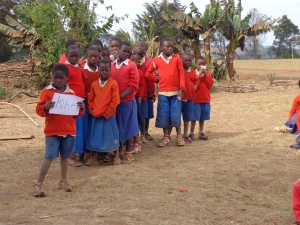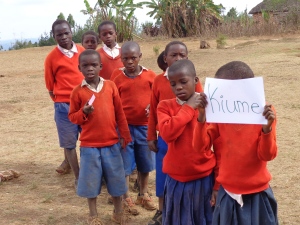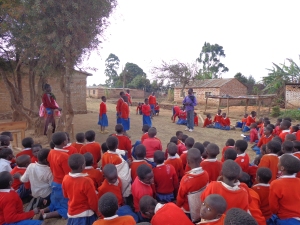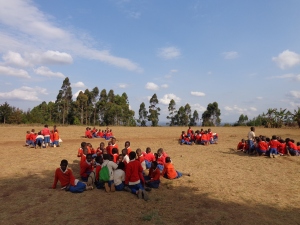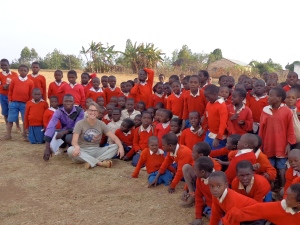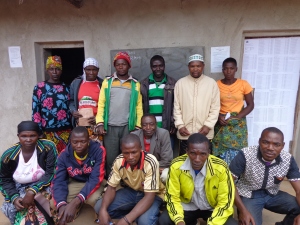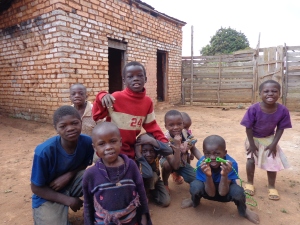Yesterday was Election Day for Tanzania, and all was surprisingly calm and peaceful. People stood in a line – crazy! a foreign concept – waiting for their turn at the polls in the village government office. It seemed like any other Sunday, except for the long line that never seemed to diminish. The polls very supposed to close at 4pm, but I saw people out there waiting until dusk, mostly women in the later hours, all wrapped in their colorful cloth. I was glad to see such apparent order, glad that no violence occurred in my village at least. I haven’t heard any news from other villages, other regions, or towns and cities in the country, but I am excited to know what is going on – and of course, after a day or two, who will be the new president! These are exciting times with the prospect of a new political party taking charge of the country.
Since getting back from Dar and the USAWA meeting, I’ve been doing a lot of planning for various activities, workshops, trainings, etc. This very afternoon I will be leading a watering workshop with my counterparts, teaching how to make improvised watering cans and slow-drip irrigation “technology” out of plastic soda or water bottles. Not only will people make tools to water their leafy greens and seedlings gently, and to conserve water through slow-drip irrigation, they will also help to clean up the environment by using the discarded plastic bottles – at least until they’ve made their watering devices and don’t need to make any more. At that point, I’m sure the waste will continue to accumulate on the roads and in the fields. Well, at least the message is there…
This Friday I also have a gender equality activity planned for the primary school students. We’ll do an activity with word associations between “male” and “female” (some kids will get cards that have different words or roles written on them – like cooking, driving a car, playing soccer, strength, love, etc. – and then they will decide if it is more closely associated with men or women). Then we’ll have some opening questions about what gender equality means.
(Pictures from the lesson! The word associations – Kike means female and Kiume means male.)
After that, there are six skits that some of the students will prepare – situations common to everyday Tanzanian life – and they will have to create an ending that shows us gender equality. (For example, so-and-so, a male, was injured and can’t go to the farm to work for a while. His wife is already busy with housework and raising the children, but she also starts work on the farm to make ends meet. Then the students will make an appropriate ending, hopefully with the father doing the housework and helping to take care of the kids in this example.)
(More pictures showing a skit being performed and the groups discussing the closing questions for the lesson.)
After each skit we’ll discuss if or how gender equality was shown, and if the ending is realistic to life in Tanzania – why or why not. Then there are a few closing questions about how women and girls can empower themselves/each other, what men and boys can do to show women respect as equals, and what changes need to be made in TZ to reach gender equality. I’ll have the help of one of my counterparts, and also some of the teachers, so hopefully it will go well and they can help facilitate and deepen the discussions.
In other news, last week, my village held two meetings (one for three of the sub-villages, one for the other two) to discuss forming a water committee and starting water projects. Both went very well with lots of enthusiasm from the people. One old man stood up and gave a long speech in his wavering, aged, and slightly intoxicated voice about the importance of water projects in the village. Then his took out a 10,000 shilingi bill (a lot for in the village) and started waving it around, trying to entice others to give to the cause. This started up a collection, during which people sang and danced.
Some seemed rather annoyed by being asked to give money, others were all for it, and my mwenyekiti did a great job of telling people to only give if and what they want at this time – there will be other collection times, and one can always give heart to the cause. About 150,000 shillings were raised from the two meetings, everyone seemed on-board and excited, and most important of all, the members of the new water committee were chosen – one male and one female from each sub-village – 10 people in all.
The new water committee! Less one woman, plus the village executive officer (in the beige coat) and my two counterparts (the 2nd and 3rd in from the left on the bottom row, in the blue sweatshirt and the gold shirt).
I’d say we are off to a good start, even though the first committee meeting has yet to happen, and who knows how long it will take to write out a constitution and officially form the group. Only after all the formalities can we start talking about potential projects. I know it’s important to go slow, though, to take it step by step and to be thorough so the committee can be the best it can be. As always, patience will be the invaluable trait. Going slow in TZ is like being at a standstill for one from American culture. But no matter what does or doesn’t get done, I just have to keep reminding myself that I am doing my job (helping the people to help themselves), even though it may not seem like it as, in my duty, I walk in the villagers shoes (or barefoot…), and am therefore forced to live by the national mantra of “labda kesho” – maybe tomorrow.
Some neighbor kids in my courtyard, having a blast.


